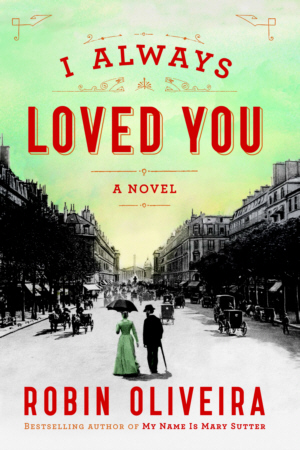I Always Loved You
Publisher Viking, February 4 2014
Paris, 1926. An aging Mary Cassatt, eyesight failing, searches through the clutter of her art studio for a bundle of lost letters. The sight of them—bound in silk ribbon, fading and difficult to make out—takes her back to her fateful introduction to Edgar Degas and to the love and heartbreak that followed. I ALWAYS LOVED YOU tells of the tumultuous and passionate relationship between these two celebrated artists of the Impressionist movement.
Forty-nine years earlier, after the Civil War, a young Mary Cassatt moves from Philadelphia to Paris to pursue a life as an artist. It proves difficult: along with her father’s outspoken disapproval of her way of life, Mary struggles to support herself with her meager earnings from painting and suffers the shame of rejection from the Paris Salon, where all of France’s most prominent artists exhibit. Then one day, a friend introduces Mary to the artist Edgar Degas, and her art—and life—are changed forever.
Edgar proves to be mercurial and temperamental; he is, in turns, charming and insolent, prone to selfishness and wounding remarks, but also charismatic, captivating, and inspiring. As artistic collaborators, friends, antagonists, and, presumably, lovers, Mary and Edgar forge an impassioned relationship that deeply impacts the nature of their art and defines both of their lives.
I ALWAYS LOVED YOU brilliantly recreates the irresistible world of Belle Époque Paris, capturing the golden age of Impressionism and peopled with many prominent figures of the movement including Édouard Manet and Berthe Morisot (the only other prominent female artist working in Paris at that time) whose own romantic relationship is also the subject of gossip and scandal. Robin Oliveira writes with grace and uncommon insight into the lives of artists and the passions and foibles of the human heart.
“What a joy it is to be back in Belle Époque Paris with my old artist friends, guided by the masterful pen of Robin Oliveira whose finely crafted language brings to light the complicated relationships of four of the principals of the Impressionist movement—Cassatt, Degas, Manet, Morisot. Only an omniscient narrator has the latitude to disclose the private yearnings and fears of these four as they grapple with issues of art execution, scathing reviews, self-doubt, elusive fame, tempestuous love, and creeping mortality. Here, in beautiful prose, juicy with nuance and depth, is the intimate, heart-wrenching story behind Impressionist art history, with Mary Cassatt at its center. A glorious achievement.”
— Susan Vreeland, author of Luncheon of the Boating Party
“I Always Loved You is a marvelous work, enthralling, illuminating, and beautifully rendered. Robin Oliveira brings Belle Époque Paris and the fascinating artists and writers who walked its streets and filled its salons to the fullness of vivid, fiercely passionate life.”
— Jennifer Chiaverini, author of Mrs. Lincoln’s Dressmaker and The Spymistress
“Oliveira’s breathtaking, cinematic novel transported me to late-nineteenth-century Paris, to lively salons and cafes, and to the refuge of the studio. There, each day, Mary Cassatt struggled to silence family obligation, doubt, set-backs, and longings, so that she could take up her brush and create. This story reveals what it means to be an artist who is also a woman, and you will feel both the anguish and the triumph down in your bones.”
— Kelly O’Connor McNees, author of In Need of a Good Wife and The Lost Summer of Louisa May Alcott
“In artfully crafted prose as penetrating and radiant as an Impressionist masterpiece, Robin Oliveira’s moving portrait of Mary Cassatt and Edgar Degas is a poignant reminder that beneath the majestic sweep of history and ideas are men and women with yearnings and trepidations as urgent and palpable as our own. I Always Loved You evokes, in brilliant detail, the nuances of culture, art, and society in the cafés and salons of late-nineteenth-century Paris while bringing to life the spellbinding whirl of artists, writers, and savants who made La Belle Époque legendary.”
–John Pipkin, author of Woodsburner

